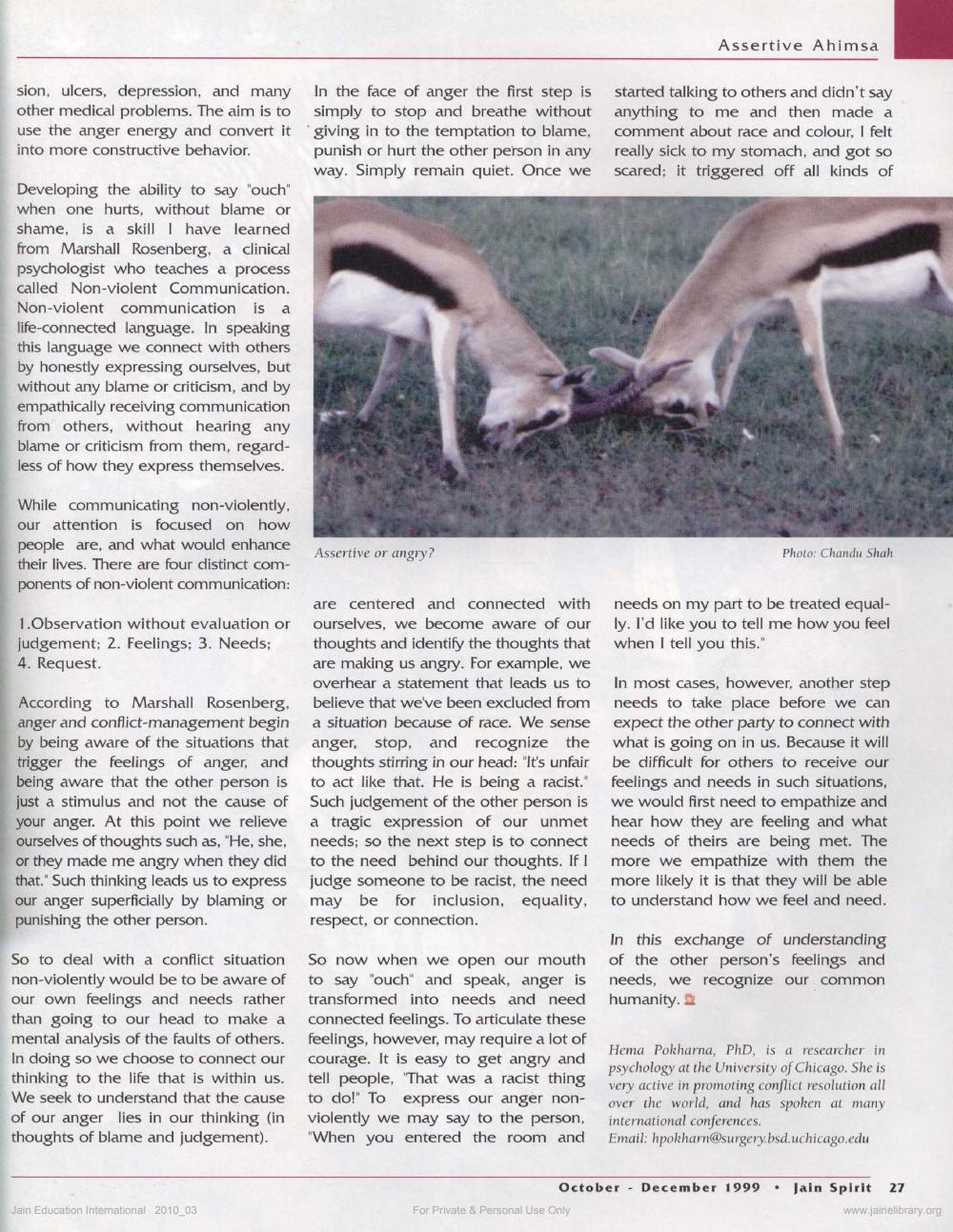________________
Assertive Ahimsa
sion, ulcers, depression, and many other medical problems. The aim is to use the anger energy and convert it into more constructive behavior.
in the face of anger the first step is simply to stop and breathe without giving in to the temptation to blame, punish or hurt the other person in any way. Simply remain quiet. Once we
started talking to others and didn't say anything to me and then made a comment about race and colour, I felt really sick to my stomach, and got so scared; it triggered off all kinds of
Developing the ability to say "ouch" when one hurts, without blame or shame, is a skill I have learned from Marshall Rosenberg, a clinical psychologist who teaches a process called Non-violent Communication. Non-violent communication is a life-connected language. In speaking this language we connect with others by honestly expressing ourselves, but without any blame or criticism, and by empathically receiving communication from others, without hearing any blame or criticism from them, regardless of how they express themselves.
While communicating non-violently, our attention is focused on how people are, and what would enhance Assertive or angry?
Photo: Chandu Shah their lives. There are four distinct components of non-violent communication:
are centered and connected with needs on my part to be treated equal1. Observation without evaluation or ourselves, we become aware of ourly. I'd like you to tell me how you feel judgement; 2. Feelings: 3. Needs; thoughts and identify the thoughts that when I tell you this." 4. Request.
are making us angry. For example, we
overhear a statement that leads us to In most cases, however, another step According to Marshall Rosenberg, believe that we've been excluded from needs to take place before we can anger and conflict-management begin a situation because of race. We sense expect the other party to connect with by being aware of the situations that anger, stop, and recognize the what is going on in us. Because it will trigger the feelings of anger, and thoughts stirring in our head: "It's unfair be difficult for others to receive our being aware that the other person is to act like that. He is being a racist. feelings and needs in such situations, just a stimulus and not the cause of such judgement of the other person is we would first need to empathize and your anger. At this point we relieve a tragic expression of our unmet hear how they are feeling and what ourselves of thoughts such as, "He, she needs; so the next step is to connect needs of theirs are being met. The or they made me angry when they did to the need behind our thoughts. If I more we empathize with them the that." Such thinking leads us to express judge someone to be racist, the need more likely it is that they will be able our anger superficially by blaming or may be for inclusion, equality to understand how we feel and need. punishing the other person. respect, or connection.
In this exchange of understanding So to deal with a conflict situation So now when we open our mouth of the other person's feelings and non-violently would be to be aware of to say "ouch" and speak, anger is needs, we recognize our common our own feelings and needs rather transformed into needs and need humanity. than going to our head to make a connected feelings. To articulate these mental analysis of the faults of others. feelings, however, may require a lot of
Hema Pokharna, PhD, is a researcher in In doing so we choose to connect our courage. It is easy to get angry and
psychology at the University of Chicago. She is thinking to the life that is within us. tell people, "That was a racist thing
very active in promoting conflict resolution all We seek to understand that the cause to do!" To express our anger non- over the world, and has spoken at many of our anger lies in our thinking (in violently we may say to the person, international conferences thoughts of blame and judgement). "When you entered the room and Email:
[email protected]
October - December 1999 • Jain Spirit 27 For Private & Personal Use Only
www.jainelibrary.org
Jain Education International 2010_03
